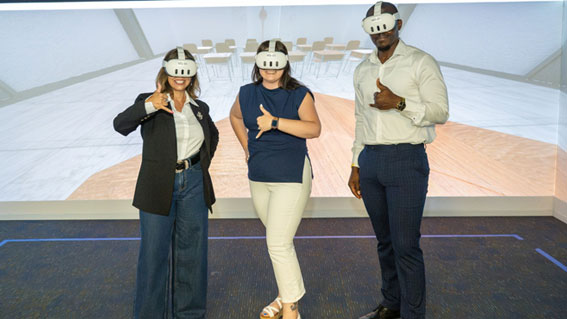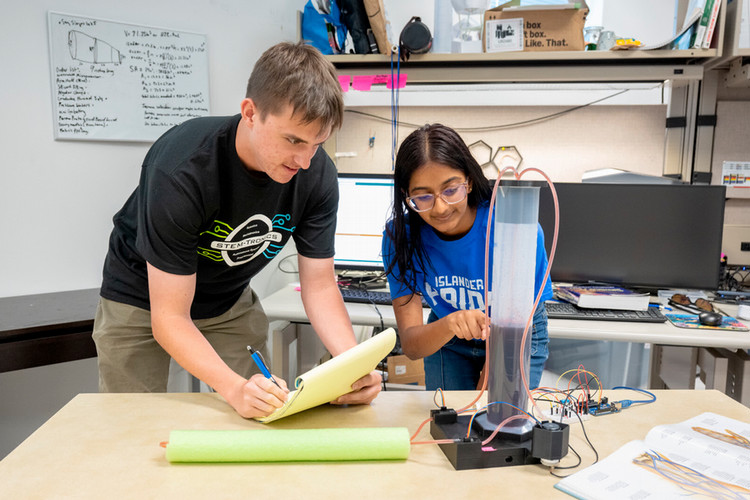TAMU-CC Researcher, Students to Study Coral Reefs in Hawaii
CORPUS CHRISTI, Texas – Changes in the chemistry of the ocean are devastating coral reefs around the world, diminishing their role as a safe haven for marine animals and as a protector of coastal areas from storms and erosion. To more fully understand what is happening to these critically important reefs, Texas A&M University-Corpus Christi Assistant Professor of Marine Biology Keisha Bahr is launching an extensive coral research project thanks to a substantial grant from the National Science Foundation.
Bahr is leading a $1 million NSF grant in collaboration with the University of Hawaii, which includes a unique partnership with the Texas State Aquarium. This grant also will provide an immersive, hands-on opportunity for TAMU-CC undergraduates to study coral reefs in Hawaii for the next three years.
“The project will study how changes in the chemistry of our ocean impact calcifying organisms, particularly coral reefs,” Bahr said. This project combines the skills of ocean carbon chemists, coral physiologists, and marine technology developers to build a state-of-the-art system that merges new ocean chemistry sensing technologies with cutting-edge methods for studying coral reef health and underlying calcification processes, Bahr said. Most importantly, students will have the opportunity to interact with experts across these fields and be involved in interdisciplinary research.
“This integrated system will be used to study the impact of climate change and ocean acidification on coral reef ecosystems that have not been previously possible,” Bahr said. “Current models that predict the fate of coral reefs are based on changes in ocean chemistry in the open ocean and have solely focused on the aragonite saturation state (a method of measuring ocean acidification). These projections do not account for the dynamic changes that occur in our coastal waters. Therefore, this proposed research challenges the paradigms that have underpinned the understanding of coral reef ecology for the past 50 years.”
Researchers will conduct experiments on corals grown in seawater tanks to examine coral response to changes in seawater chemistry and characterize the small-scale chemical gradients surrounding the corals under different environmental conditions. These experiments will help determine the factors that drive coral calcification in a changing ocean.
The project will support the training of several early career researchers, Ph.D. students, undergraduates, and high school students in the disciplines of chemistry, engineering, and marine ecology.
“We are very excited to involve students in this research through paid research internships. These students will be deeply involved in all aspects of the proposed project, including experiments, analysis, presentation, and outreach. The students also will develop and lead their research project,” Bahr said.
The plan is for student research projects to span disciplines such as ecology, engineering, and chemistry, and focus on sensor and technology development, coral ecology and physiology, and ocean chemistry characterization. Projects will be completed by the end of the four-week program and presented at a symposium open to both TAMU-CC and the University of Hawaii campuses.
“They will have the unique opportunity to stay and conduct research at a state-of-the-art research institute, the Hawaii Institute of Marine Biology, while working alongside researchers and educators,” Bahr said. “Undergraduate trainees will gain new perspectives on research disciplines and local community culture while expanding their professional networks and honing their communication skills. Our goal is to equip these students with the skillsets they need to pursue a STEM career following the completion of their degree.”
The project also will include science-inquiry labs and virtual learning.
“We will partner with the Texas State Aquarium to communicate with the general public through a virtual research expedition series that will focus on coral reef health,” Bahr said.
The series will include interviews, behind the scene tours, and virtual dives on coral reefs in Hawaii.
“The virtual learning program will allow students to engage with scientists, coral reefs, and the ocean regardless of their location,” Bahr said.
Content produced during the virtual coral reef research expedition will be integrated and available for viewing at the aquarium, where Bahr has established and ongoing research projects and outreach events.
“Through these education platforms, we will create and facilitate public outreach engagements about coral reef initiatives focused on restoration and recovery of coral reefs in the Hawaiian Islands and the Gulf of Mexico,” Bahr said.
“The Texas State Aquarium is excited to continue our partnership with Dr. Bahr by sharing her critical work with the public,” said Texas State Aquarium Director of Operations Justin Sefcik. “Utilizing the Flint Hills Resources Distance Learning Studio, the aquarium will connect with Dr. Bahr virtually to allow viewers a unique opportunity to learn about the life of a scientist in the field, and the format of a recurring series will provide continued insight into the progression of her research during the life of the project. We look forward to following Dr. Bahr on her journey and continue to support her work.”







